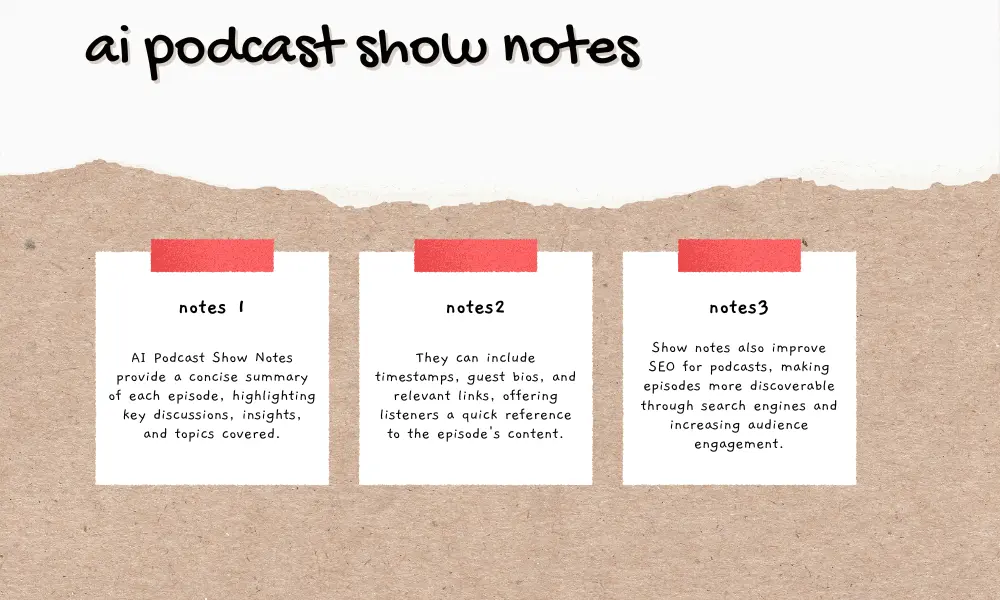How to Create AI Podcast Show Notes in 2024
Published: 9 Dec 2024
Introduction:
If you’re running a podcast, especially in a niche like artificial intelligence (AI), crafting effective show notes is essential to engage your audience and improve SEO. Show notes are more than just a summary of your episode—they help listeners understand what to expect, highlight key moments, and direct them to additional resources.

Why Are AI Podcast Show Notes Important?
Podcast show notes are vital for several reasons:
SEO Boost:
-crafted show notes improve the discoverability of your podcast episodes on search engines.
Listener Engagement:
Timestamps, key takeaways, and detailed episode summaries make it easier for listeners to navigate the episode.
Accessibility:
They provide a written record of the episode for those who prefer reading or who are hearing impaired.
Conversion:
They help convert casual listeners into loyal subscribers by providing clear CTAs (calls-to-action), social media links, and easy ways to share or subscribe to the podcast.
.Top 10 AI Podcasts Listen To in 2024
.Advantages and Disadvantages of AI in Podcast Production
What Should Be Included in AI Podcast Show Notes?
- Here’s a breakdown of the key sections to include in your AI podcast show notes, ensuring that your listeners can easily find the information they need:
Episode Title & Meta Info
Start with the episode title and meta info. Make it clear, catchy, and SEO-optimized. Don’t forget to include:
Episode Number:
This helps listeners keep track of the series.
Guest Information:
If you have a guest, mention their name, title, and a quick introduction.
Example:
Episode #25: AI in Healthcare – The Future of Medicine
Guest: Dr. Sarah Lee, AI Specialist in Healthcare
Episode Summary
The episode summary is a short, engaging description of what the episode covers. Use relevant keywords to help it rank better on search engines. Include the main topics, insights, and goals of the episode.
Example
“In this episode, we explore how artificial intelligence is transforming the healthcare industry. Dr. Sarah Lee shares her expert insights on AI in diagnostics, personalized medicine, and the challenges healthcare systems face in implementing AI technologies.”

Key Takeaways
Bullet points or a short list of the most important takeaways from the episode will allow your audience to get a quick overview of the episode. Keep it concise and actionable.
Example:
- AI in diagnostics: How AI tools help healthcare professionals detect diseases faster.
- Personalized medicine: The role of AI in customizing treatment plans for patients.
- Challenges in adoption: Why many healthcare systems struggle to adopt AI, despite its potential.
- Future of AI: What’s next for AI in the medical field?
Episode Timestamps & Highlights
This section is essential for giving your audience control over how they navigate the episode. Provide timestamps for key moments, topics, or discussions within the episode. This allows listeners to skip directly to sections that interest them most.
Example:
00:00 – Introduction
02:30 – AI’s impact on diagnostic accuracy in healthcare
10:00 – How machine learning is reshaping personalized medicine
20:00 – AI challenges in widespread adoption
30:00 – The future of AI in healthcare and innovations to look out for
35:00 – Closing thoughts
Guest Profile
If your podcast features a guest, provide a short bio to introduce them. Include their relevant credentials and why they’re a valuable voice in the discussion.
Example:
“Dr. Sarah Lee is a leading expert in AI healthcare solutions, with over 10 years of experience in applying machine learning algorithms to improve medical diagnoses. She is currently a senior researcher at MedTech Labs.”
Resources & Links Mentioned
Listeners love to have easy access to resources mentioned during the podcast. Include links to research papers, articles, tools, books, or any other resources discussed in the episode.
Example:
- AI Healthcare Paper by Dr. Sarah Lee
- MedTech Labs – AI Innovations in Healthcare
- Book: The AI Revolution in Healthcare by John Doe
Call to Action (CTA)
Encourage your audience to take action after listening to the episode. Whether it’s subscribing to your podcast, leaving a review, or connecting with you on social media, a strong CTA is essential to growing your community.
Example:
“Enjoyed today’s episode? Don’t forget to subscribe and leave us a review on Apple Podcasts. Join the conversation on Twitter @AIpodcast and tell us your thoughts on AI in healthcare!”
Social Media & Subscription Links
Provide easy access to your social media profiles and subscription links for various podcast platforms. This makes it easy for listeners to stay connected and share your content.
Example:
- Subscribe on Apple Podcasts
- Follow us on Twitter
- Join us on LinkedIn
Full Transcript (Optional)
Providing a full transcript of the episode is a great option for listeners who prefer reading or need the content in text form. This also helps improve your SEO rankings.
Example:
“Click here to read the full transcript of Episode #25: AI in Healthcare.”
Pro Tips for AI Podcast Show Notes
Keep It Simple:
Avoid overloading your show notes with unnecessary details. Focus on the key takeaways and resources.
Use Multimedia:
Embed podcast players, videos, or images to make your show notes more interactive.
Update Regularly:
If your episode covers evolving topics like AI, update the notes with new insights or developments.
Track Engagement:
analytics tools to see which links or CTAs in your show notes perform the best.
Example AI Podcast Show Notes Template
Here’s a quick template you can follow for your AI podcast show notes:
Conclusion
Creating AI podcast show notes doesn’t have to be complicated. With a clear structure, engaging content, and optimized keywords, you can provide immense value to your listeners while increasing your podcast’s discoverability. Use this guide to streamline your process and watch your AI podcast audience grow!
AI podcast show notes are brief summaries or key highlights of a podcast episode, often enhanced by AI tools to streamline content generation. They typically include an episode summary, timestamps for important topics, guest introductions, and any relevant links. In 2024, AI-powered tools can analyze the podcast content and generate comprehensive, SEO-optimized show notes more efficiently. They help listeners quickly understand the episode’s content, boost discoverability through search engines, and enhance user engagement.
Several AI tools have emerged to automate the process of generating podcast show notes in 2024. Some popular ones include:
Descript: Automatically transcribes podcast episodes and allows users to edit text-based show notes from the transcription.
Otter.ai: Transcribes audio files into text, making it easier to create structured and accurate show notes.
AI-powered Podcast Editors (like Auphonic or Sonix): These tools not only help with transcription but also assist in summarizing key discussion points, organizing timestamps, and drafting engaging notes.
AI-generated show notes can boost podcast discoverability by incorporating relevant keywords, key phrases, and proper formatting that enhances SEO. By providing listeners with detailed timestamps, relevant links, and a clear episode summary, these notes improve user experience. Additionally, AI can help craft more engaging and clickable titles, descriptions, and metadata that attract a wider audience, increasing the podcast’s visibility across platforms like Apple Podcasts, Spotify, and Google Podcasts.
Proudly powered by WordPress







tVVEeZhXkFsaNozqSKQP